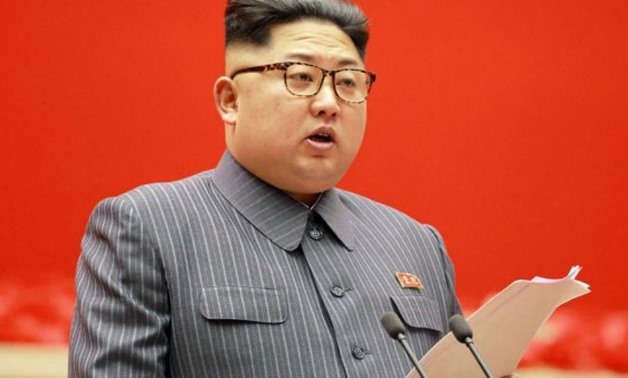
© KCNA VIA KNS, AFP | This picture taken on December 21, 2017 and released from North Korea's official Korean Central News Agency shows North Korean leader Kim Jong-Un the 5th Conference of Cell Chairpersons of the Workers' Party of Korea in Pyongyang.
WASHINGTON/SEOUL - 26 May 2018: U.S. President Donald Trump late on Friday said the United States was having "productive talks" about reinstating a June 12 summit with North Korea's leader Kim Jong Un, just a day after he cancelled the meeting citing Pyongyang's "open hostility."
"We are having very productive talks about reinstating the Summit which, if it does happen, will likely remain in Singapore on the same date, June 12th., and, if necessary, will be extended beyond that date," Trump said in a Twitter post.
South Korea's presidential spokesman said in response: "We are cautiously optimistic that hope is still alive for US-North Korea dialogue. We are continuing to watch developments carefully."
Trump had earlier indicated the summit could be salvaged after welcoming a conciliatory statement from North Korea saying it remained open to talks.
"It was a very nice statement they put out," Trump told reporters at the White House. "We'll see what happens - it could even be the 12th.
"We're talking to them now. They very much want to do it. We'd like to do it."
After years of tension over Pyongyang's nuclear weapons program, Kim and Trump agreed this month to hold what would be the first meeting between a serving U.S. president and a North Korean leader. The plan followed months of war threats and insults between the leaders over North Korea's development of missiles capable of reaching the United States.
Trump scrapped the meeting, planned for Singapore, in a letter to Kim on Thursday after repeated threats by North Korea to pull out over what it saw as confrontational remarks by U.S. officials demanding unilateral disarmament. Trump cited North Korean hostility in canceling the summit.
In Pyongyang, North Korean Vice Foreign Minister Kim Kye Gwan said North Korea's criticisms had been a reaction to American rhetoric and that current antagonism showed "the urgent necessity" for the summit.
He said North Korea regretted Trump's decision to cancel and remained open to resolving issues "regardless of ways, at any time."
Kim Kye Gwan said North Korea had appreciated Trump having made the bold decision to work toward a summit.
"We even inwardly hoped that what is called 'Trump formula' would help clear both sides of their worries and comply with the requirements of our side and would be a wise way of substantial effect for settling the issue," he said.
DIPLOMATS AT WORK
Trump's latest about-face sent officials scrambling in Washington. Defense Secretary Jim Mattis told reporters diplomats were "still at work" and said Trump had just sent a note out on the summit, which could be back on "if our diplomats can pull it off."
U.S. State Department spokeswoman Katina Adams declined to give details of any diplomatic contacts but said: "As the president said in his letter to Chairman Kim, dialogue between the two is the only dialogue that matters. If North Korea is serious, then we look forward hearing from them at the highest levels."
White House spokeswoman Sarah Sanders told reporters Trump did not want a meeting that was "just a political stunt."
"He wants to get something that’s a long-lasting and an actual real solution. And if they are they are ready to do that then ... we’re certainly ready to have those conversations," she said.
North Korea had sharply criticised suggestions by Trump's national security adviser, John Bolton, and Vice President Mike Pence that it could share the fate of Libya if it did not swiftly surrender its nuclear arsenal. Libyan leader Muammar Gaddafi was deposed and killed by NATO-backed militants after halting his nascent nuclear program.
Trump had initially sought to placate North Korea, saying he was not pursuing the "Libya model" and Sanders said he was following "the President Trump model."
U.S. regional allies Japan and South Korea, as well as North Korea's main ally, China, urged the two countries to salvage the summit on Friday.
At an economic forum in St. Petersburg, Chinese Vice President Wang Qishan said it was necessary to ensure security on the Korean peninsula, which touched on China's core interests.
Japanese Prime Minister Shinzo Abe, at the same forum, regretted the cancellation and said the world should keep doing its bit to make the summit happen.
South Korea also would continue efforts to improve ties with the North, the office of President Moon Jae-in said after Moon's top security advisers met for the second time on Friday.
Some analysts worried that canceling the summit could prompt a resumption in hostilities, including renewed shorter-range missile tests or stepped-up cyber attacks by Pyongyang and increased sanctions or deployment of new military assets by Washington.
In his letter, Trump warned Kim of the United States' greater nuclear might, reminiscent of his tweet last year asserting that he had a "much bigger" nuclear button than Kim.
While the Trump administration had insisted on North Korea's complete, verifiable and irreversible dismantling of its nuclear program, Pyongyang had always couched its language in terms of denuclearization of the Korean peninsula.
It has said in previous, failed talks that it could consider giving up its arsenal if the United States provided security guarantees by removing its troops from South Korea and withdrawing its so-called nuclear umbrella of deterrence from South Korea and Japan.


Comments
Leave a Comment